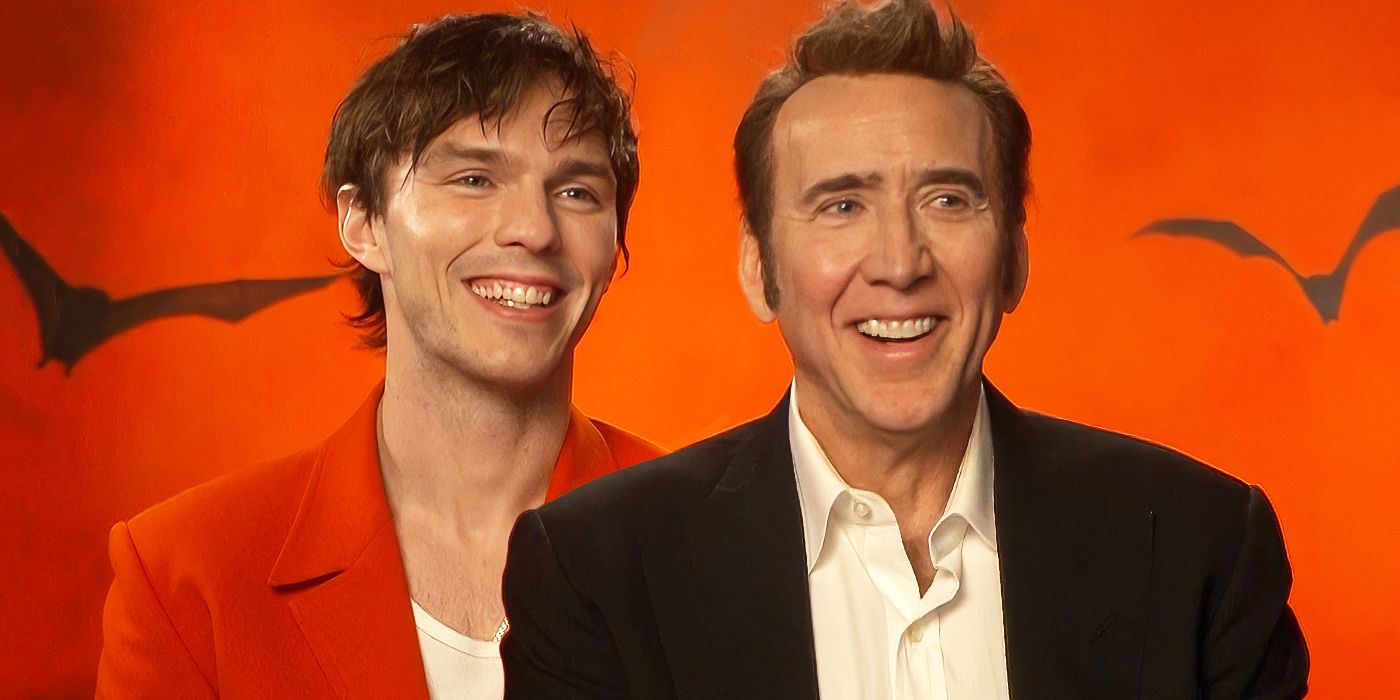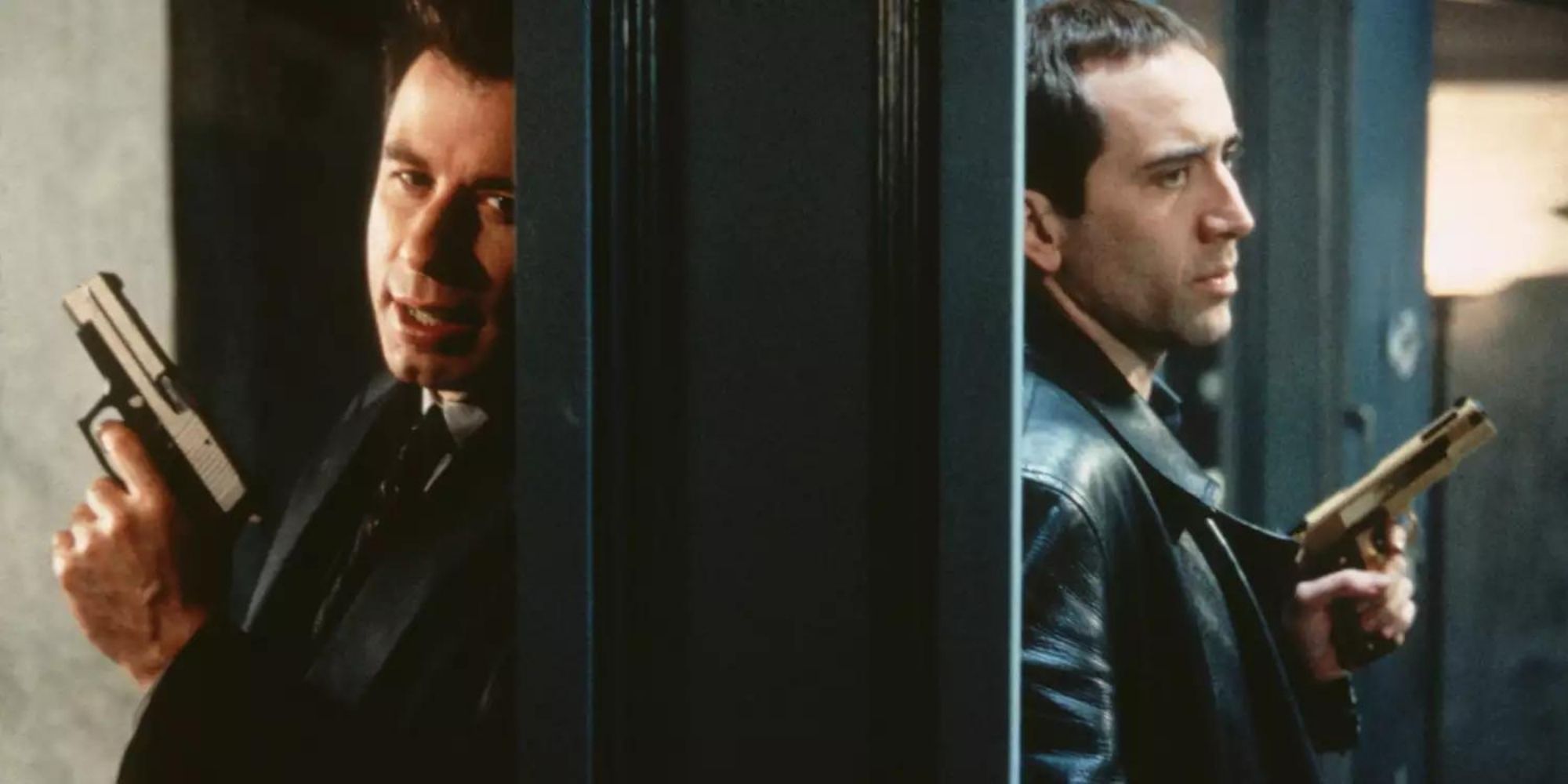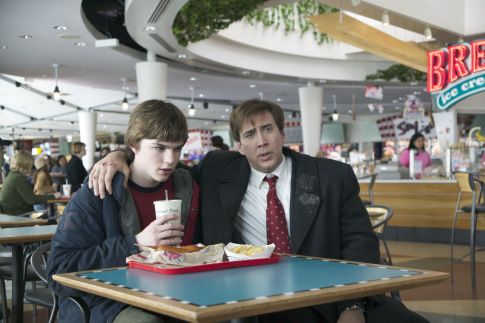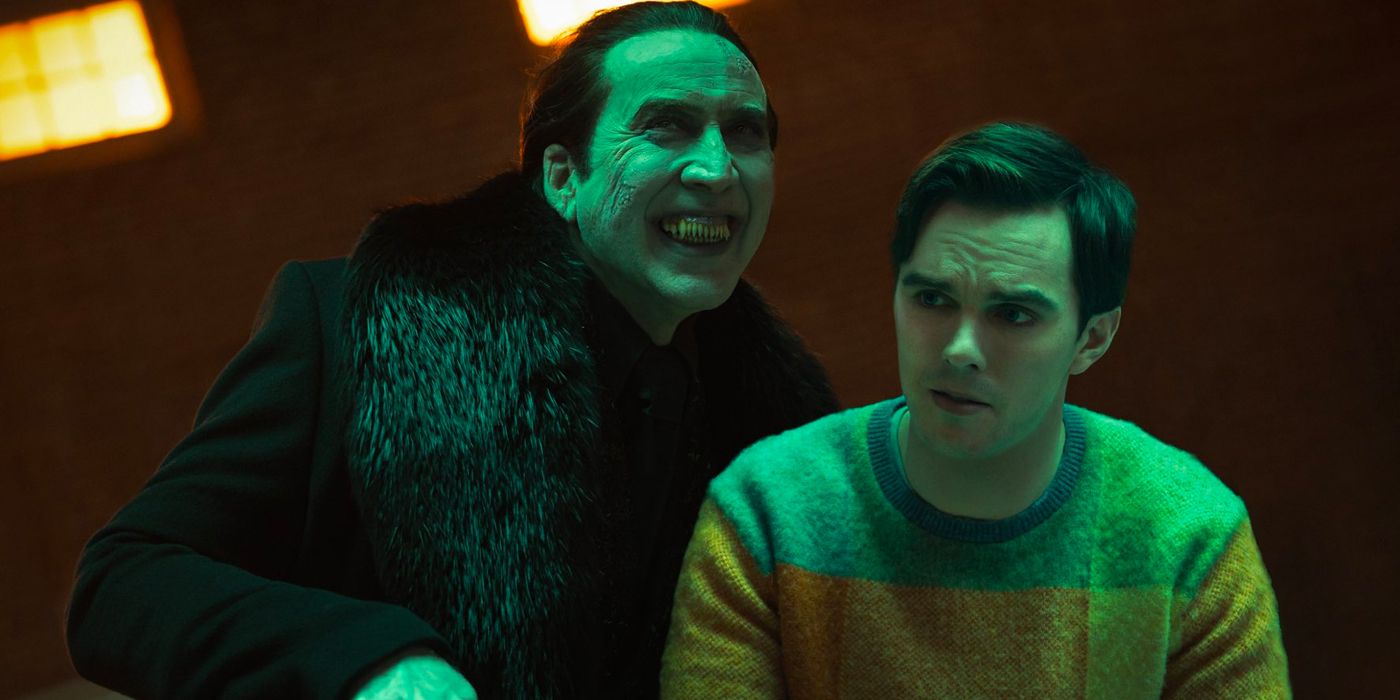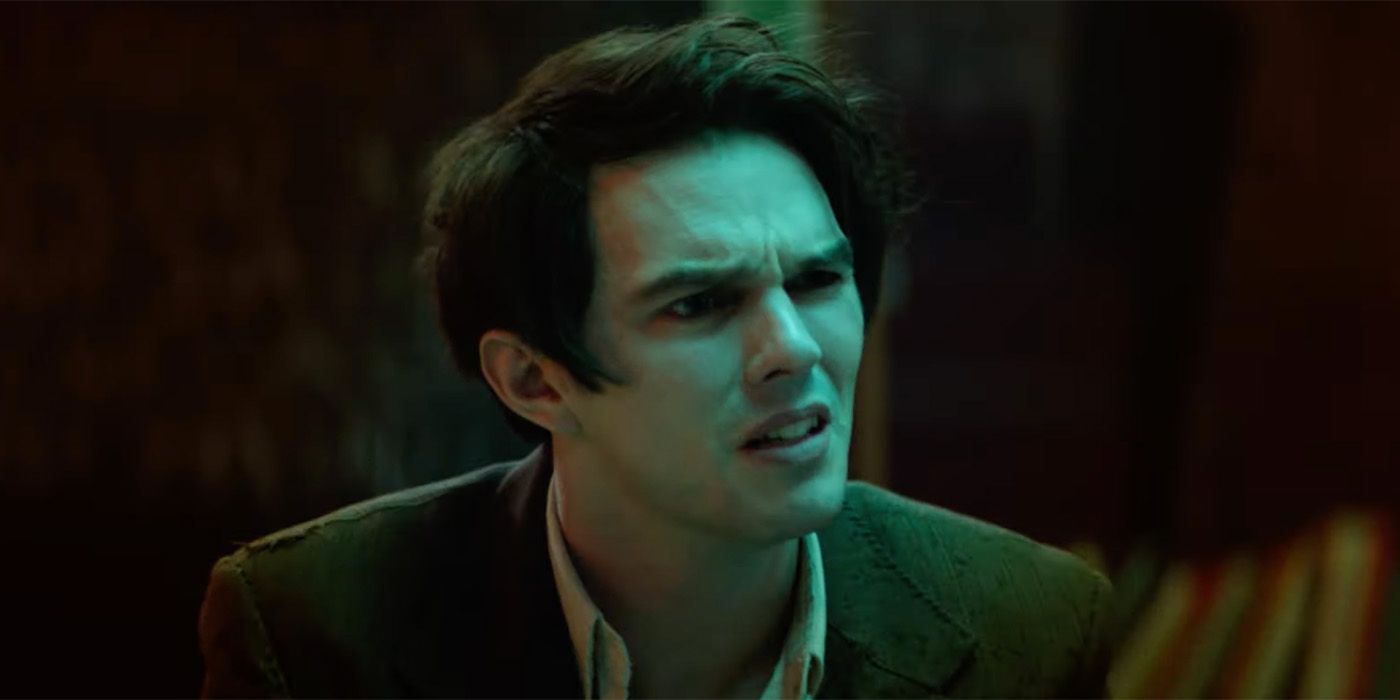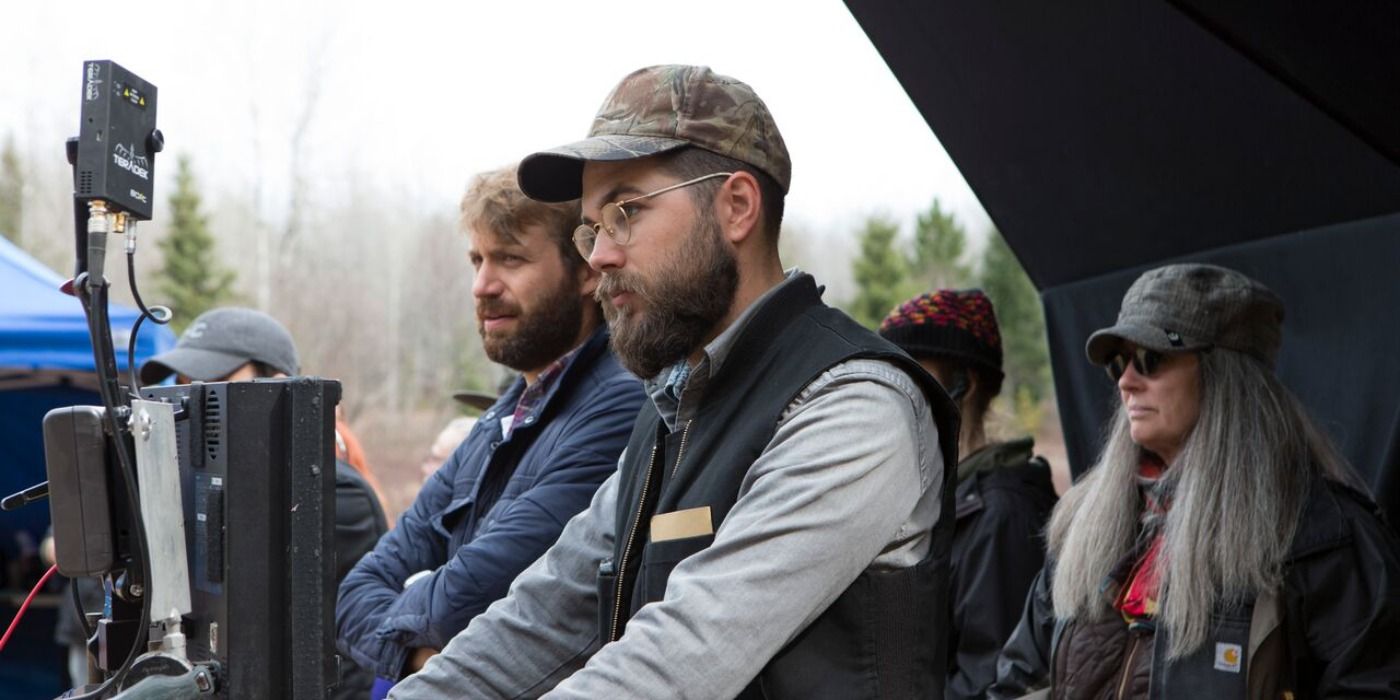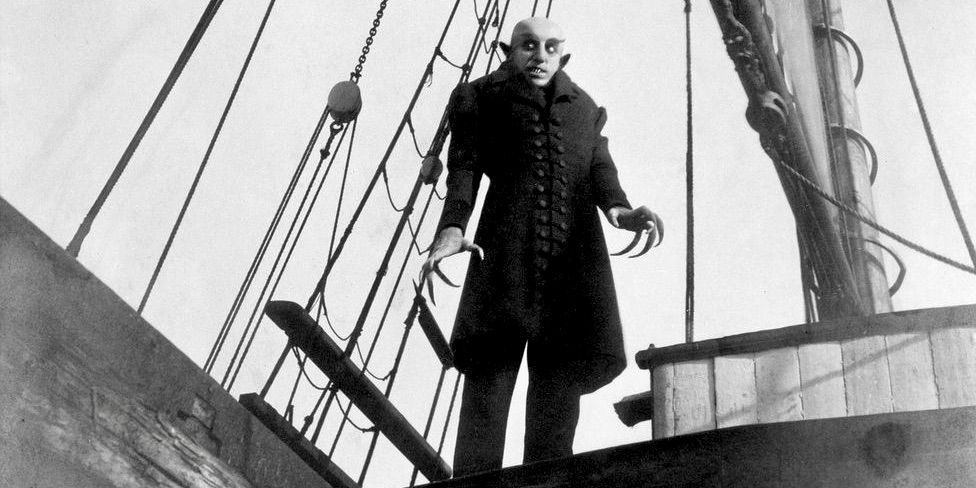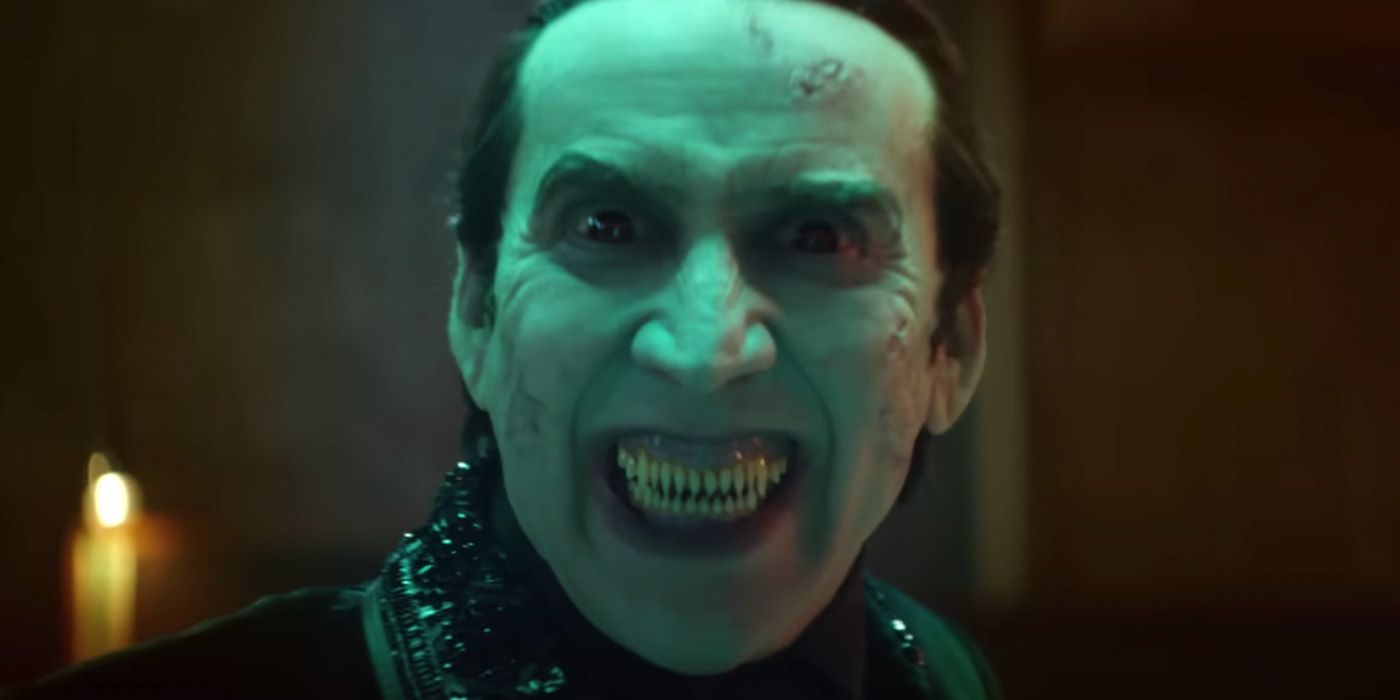Bram Stoker’s iconic vampire, Count Dracula, has been reimagined in countless ways over the years, but never quite like director Chris McKay’s retelling in Renfield. For the first time in his career, Nicolas Cage is portraying Dracula, an enigmatic figure in pop culture, and is reuniting with former The Weather Man co-star, Nicholas Hoult, who plays the lead as the titular devoted servant to the Lord of Death, Renfield, in a performance Cage describes as “Chaplin-esque.” Before the movie hits theaters tomorrow, Collider’s Steve Weintraub had the opportunity to sit down and talk with Cage and Hoult about this “dream come true” experience.
In Renfield, it’s been nearly a century since Robert Montague Renfield fell into the service of Count Dracula, a being that thirsts for human blood and possesses powers beyond comprehension. Set in the modern day, Renfield is beginning to long for a life independent of what Cage describes as a “toxic, perverse love that's evolved into something completely untenable.” The dark comedy balances a combination of tones with its heavy themes and campy silliness, and is, according to Collider’s Maggie Boccella, “...a perfect watch for any vampire fan looking to sink their teeth into something new.”
While discussing the movie, which you can watch in the video above or read below, Cage and Hoult break down how they filmed the sequences from Dracula (1931), what it takes to pull off a production with gallons of practical blood, and the scenes that impacted them most. Cage shares with us the influences behind his Dracula, Hoult discusses working with Robert Eggers on the filmmaker’s reimagining of Nosferatu, and they share what they learned from each other on set.
COLLIDER: Gentlemen, I really want to start with a sincere thank you for making me laugh, and thank you for the amount of blood that you had on set because I loved it. I was all in. But before we get started on why I get to talk to you guys today; Nic, last time I spoke to you, I asked you about this at the end, now I'm going to ask you about it at the beginning, what do I need to do for Face/Off 2?
NICOLAS CAGE: Oh, well, I have to be careful what I say. In fact, they even said to me the less I know the better, so you can read between those lines.
Sure, I will not pressure you anymore except to say I really, really would love this to happen, and I hope it does.
NICHOLAS HOULT: Same.
CAGE: Absolutely, me too.
Last time we spoke, I asked Nic this question, so I'm going to switch over to your partner in crime. If someone has actually never seen anything you've done before, what is the first thing you'd like them watching, and why, besides Renfield?
HOULT: Besides Renfield? That was my first answer, right there. What would I like them to watch, and why? That's a difficult question. I think, perhaps, watch– the thing that I've been enjoying shooting a lot at the moment is The Great, the show about Catherine the Great. I guess I’ve played that character for the longest of any characters that I've played, Peter. So I got to explore a lot within him, and kind of unpack it in a way that with other characters I haven't had the opportunity to as much. So, perhaps that.
CAGE: I have my own favorite, besides Renfield. I just saw him in The Menu and I called him.
HOULT: Oh, that was very nice of you.
CAGE: I thought that was fantastic. I thought that was one of my favorite movies, if not my favorite movie, all year. He was amazing. Him with [Ralph Fiennes]? Magnificent performances.
HOULT: Oh no, you know what we should be saying? The Weather Man, the one that we did. I got to play Nic’s son when I was 14, and that, I think, is a brilliant movie. I think it really stands up, and (director) Gore [Verbinski] did wonderful work, and Steve [Conrad], the writer, was really funny and dark and twisted, and Nic’s performance is hilarious.
I was going to say that's actually an underrated movie. I don't think enough people appreciate it.
CAGE: Sure, I agree with that.
So I love the recreation of the original Dracula. You guys getting to do those scenes, it's fantastic. Talk a little bit about, specifically, filming those moments because that's huge. That original film, it changed cinema, and getting to recreate those scenes, I can't imagine what it was like.
CAGE: Well, it was a bit like ping-pong. So what would happen was, Nick and I would be on set and then they would play, on video playback and sound playback, Dwight Frye. Then we would hear it and then he would ping-pong and recreate it, and then they would do Bela Lugosi and I would hear and ping-pong, and recreate. So it was like “action,” playback, “action,” playback, “action” until we got into this groove. We had to line it up specifically with the frame from the ‘30s classic. So every move had to match. It was a timing and a vocal.
HOULT: Yeah, all of those things. It was very specific in terms of recreating, but also just magical as fans of the original film to then kind of get implemented into it in that fashion was, yeah, it was very exciting.
CAGE: It was a lot of fun, a dream come true.
What I like about your relationship is that some of it is father/son and some of it is complete abuse.
CAGE: Well yeah, I mean, we have these situations sometimes, and not talking about anybody specifically, but it happens in families. You get that sometimes in families.
HOULT: And also, there's care and love between these two characters. There was a moment when you're back at the lair, and very weak after being burned to a crisp, essentially, and it was almost like taking care of an elderly relative, or something, where it's like trying to nurse you back to health. And they do have this very complicated relationship.
CAGE: Kind of a toxic, perverse love that's evolved into something completely untenable, which is where we’re getting the comedy from, but it’s actually a pretty serious subject.
HOULT: It’s too much baggage to unpack for these two.
When you signed on to do this movie, did Chris or anyone at the studio let you know how much blood was going to be practical on set? Because I think a lot of people don't realize what it takes to use that much practical blood and the resets on set between each take.
HOULT: Yeah, I mean, it was something that Chris, I know, really was committed to, and wanted to do in our film. It was something that could set it apart from other movies, particularly, as well. So, I mean, there was a lot of blood, and the thing I was mentioning earlier about that is, particularly when you're punching a head off, there's obviously little explosives, and then a lot of blood, and all these things that have to be timed out to the millisecond to work and be effective, and seem plausible and believable.
Then it was a lot of drilling and rehearsals to make sure that in those moments, everyone was dialed in to do it correctly on the take because otherwise, it'd be a big clean up, and a reset, and there goes your schedule for the day.
CAGE: But I do remember Chris McKay taking me into his office before production even began, early on, when he was still talking to me about playing the role and I hadn't committed yet. He showed me this wonderful video sequence of what he wanted to achieve in this movie, the tone of the movie, and right off the get-go, I said yes. I knew he was on to something special, something that would be very entertaining and very surprising.
I love the shot of you, the apartment fight sequence, where you're going down and you're breaking the dude in half and you're smiling at Awkwafina. For a shot like that, can you explain to people watching what it takes to do that shot? It's just fantastic, and also, her reaction, the blood, everything about that shot is great.
CAGE: Pure cinema.
HOULT: [Laughs] Well, [there are] lots of different elements that go into that. James [Newman], my stunt double, was doing some of the wider shots because we were actually also on our different units, as well, at the same time. So he was surfing a fake body down on wires, and then there's obviously a huge blood explosion, and rigs of packs of all that sort of stuff to go off. And then, Chris McKay came up with the great idea of having kind of a sweet little wave and smile – which is just completely the opposite of everything that's happening in that moment – to Nora, as I kind of ride this body past and demolish it. So it was a very fun, cinematic moment.
CAGE: I don't normally like to compare actors, but if I had to compare any actor, there is a slight Chaplin-esque flavor to what he brings as Renfield in some of those sequences.
HOULT: That’s a big compliment, thank you.
I love your voice as Dracula, and I loved your performance in this. Can you sort of pull the curtain back? Before you step on set, how are you finding the voice? How are you figuring out how you want to make your version of Dracula on screen?
CAGE: Some of it is up to what happens empathically in the imagination. I leave myself open to inspirations that kind of pop in and go, ‘Hello!’ and then they come out. Much of it was something that I had already developed on Vampire's Kiss, meaning my father's voice, August Coppola. I think that was the main influence. The look [was] more Christopher Lee with a little Anne Bancroft from Mrs. Robinson thrown in. I thought those were all good models for the character. And then, like I said, it happened accidentally through the imagination and playing the scenes with Nick.
When you guys looked at the schedule before filming began, was there a day you had circled like, ‘This is going to be an amazing day,’ or, ‘This is going to be the most challenging day of the shoot.’?
HOULT: I mean, because [there are] kind of six key scenes between us, five or six maybe, and all of those were circled in my mind. Their relationship is the core of the movie, so they're the ones that are most important for us to really nail and hit, but also, the ones that I was looking forward to most because I got to work with Nic, and bring them to life. To get to be in those moments, occasionally, I would step out of my body and be like, ‘This is incredible,’ seeing you in full Dracula mode, in those moments, which is something that I'll treasure.
CAGE: I feel that the scene early on in the – we called it the Picasso look for the character – 20 pounds of makeup, with the face and the body, and it was quite extended dialogue. That was the day that I was most concerned about, that I would have the energy and the wherewithal to get through it, but thankfully it worked out.
I read that you saw Nosferatu when you were five years old and it had an impact on you, and I believe you might be doing Nosferatu with Robert [Eggers], unless I'm wrong about that?
HOULT: Yes, yeah we’re shooting at the moment, yeah.
Exactly. So I wanted to know what that was like seeing that film at a young age, and what can you tease about your new version of Nosferatu?
CAGE: Well, see, it had such a huge impact on me. This is the thing about growing up with a professor of Comparative Literature who was also a doctor of Fine Arts. I mean, he was always exposing me to movies that were, perhaps, terrifying for a five-year-old and nonetheless, they stayed with me, and hence sort of formed where I was going with my own film work. I never forgot those early German expressionistic movies, [The Cabinet of Dr. Caligari] and Nosferatu were running in the house all the time, and I would go to bed and have nightmares about it.
So of course, I had to do something with it. I made Shadow of The Vampire, I did Vampire's Kiss, and try to embody Max Schreck and Count Orlock’s moves, and all that stuff, you know. I thought Willem [Dafoe] was great in Shadow of the Vampire.
Yeah, Willem’s okay. He’s a decent actor.
CAGE: Yeah, he’s alright.
[Laughs] Yeah, he'll land on his feet.
HOULT: Yeah, in terms of reimagining that story, Robert Eggers, I think, is one of the most exceptional, brilliant directors we have at the moment, and his approach to storytelling, his approach to being authentic and true, and the way he designs shots and tells the story are just remarkable. So I'm very excited by what he's creating and his version of Nosferatu. I know it's a film that he's been wanting to make since he was eight years old. He did a play of it in school and directed that, and to see his vision come to life is really special.
Robert's talked to me about the film, but the thing that I love about Robert is the way that he tries to be as authentic to the time period as possible, whether that be using the film equipment of the era or whatever he needs to do to create it. Are you guys using any sort of vintage equipment?
HOULT: We're shooting on film, 35mm. The lenses you'd have to quiz them on. We are using some vintage lenses, but I don't know if they're era-specific. So you'd have to ask them that, sorry.
I'm a big fan of both of your work. I'm curious for both of you because you haven’t worked together in a while, do you guys have any similar styles when you're on set? Like before the scene begins, are you psyching yourself up? Are you listening to music? Are there similarities, and how are you guys different?
CAGE: Well, I don't listen to music because I want my instrument to be open to whatever I can – sounds ridiculous, but grab from the Beyond, meaning my imagination, so I don't want anything cluttering that.
But the difference on this movie than The Weather Man was I was the lead of The Weather Man, and he was supporting. On this movie, he's the lead, he's Renfield, and I'm supporting. So for me as a supporting actor, my job is to, just that, support the lead. So I had to find out where he was going, what pace he was setting with the comic timing, and also watching him flip into vulnerability on a dime and grab pathos and do things that were completely brand new with the Renfield character. So that informed where I could go as Dracula so that it would coalesce as a whole piece that we were one, really, working together, like jazz.
HOULT: Yeah, for me, you know, when I was 14 working with Nic, it was kind of just an overwhelming experience where you take it all in and can appreciate it, but you can't fully grasp or understand it. So now getting to work with him again as an adult, I was just in awe of the detail and where he draws inspiration from, and the fun that he's having and keeping it fresh and alive within scene. So those are all things that I'm just like, in the back of my mind I'm there and I'm trying to give my performance, but also, I'm just trying to filtrate things into my bank to keep, to store up to try and be more like him as an actor, and learn and be better at the craft myself.
CAGE: I learned from him. I mean, I always say, ‘Stay a student, you're never a master.’ You stay in the student's mind because you'll learn something.
I have to wrap, but I just want to give a shout-out to (second unit director) Chris Brewster.
HOULT: Oh yeah, he was incredible.
Yeah, he did some great work on this.
CAGE: Oh yeah, it was important to me that Dracula moved like a cobra, or a big cat on attack, and he helped me find that. Those scenes with Dracula on attack were very carefully designed with Brewster.
Renfield is in theaters April 14. For more on the movie, check out our interview with Awkwafina.

